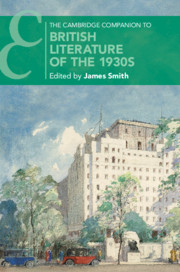Book contents
- The Cambridge Companion to British Literature of the 1930s
- The Cambridge Companion to British Literature of the 1930s
- Copyright page
- Contents
- Notes on Contributors
- Introduction
- Chapter 1 Poetry
- Chapter 2 The Literary Novel
- Chapter 3 Drama
- Chapter 4 Publishing and Periodicals
- Chapter 5 The Middlebrow and Popular
- Chapter 6 Modernism
- Chapter 7 Communism and the Working Class
- Chapter 8 Empire
- Chapter 9 Travel
- Chapter 10 The Regional and the Rural
- Chapter 11 The Queer 1930s
- Chapter 12 Remembering and Imagining War
- Chapter 13 Fascism and Anti-Fascism
- Chapter 14 Fashioning the 1930s
- Index
- Cambridge Companions to …
Chapter 9 - Travel
Published online by Cambridge University Press: 18 December 2019
- The Cambridge Companion to British Literature of the 1930s
- The Cambridge Companion to British Literature of the 1930s
- Copyright page
- Contents
- Notes on Contributors
- Introduction
- Chapter 1 Poetry
- Chapter 2 The Literary Novel
- Chapter 3 Drama
- Chapter 4 Publishing and Periodicals
- Chapter 5 The Middlebrow and Popular
- Chapter 6 Modernism
- Chapter 7 Communism and the Working Class
- Chapter 8 Empire
- Chapter 9 Travel
- Chapter 10 The Regional and the Rural
- Chapter 11 The Queer 1930s
- Chapter 12 Remembering and Imagining War
- Chapter 13 Fascism and Anti-Fascism
- Chapter 14 Fashioning the 1930s
- Index
- Cambridge Companions to …
Summary
The end of the First World War and the relaxation of restrictions on travel that were in place during it produced a sense of release, among other emotions. Paul Fussell employs an aptly exuberant simile when he refers to the many writers who were ‘propelled on their post-war travels as if by a wartime spring tightly compressed’. Besides those that will be discussed in this chapter, Fussell’s list of several members of the ‘British Literary Diaspora’ who travelled or went to live in exile around the globe includes Norman Douglas, Lawrence Durrell, V. S. Pritchett, and Robert Graves. The propulsion that Fussell describes is evident in D. H. Lawrence’s statement in his Sea and Sardinia (1921): ‘Comes over one an absolute necessity to move.’ This urge to mobility is often accompanied by an energetic sense of inquiry.
- Type
- Chapter
- Information
- The Cambridge Companion to British Literature of the 1930s , pp. 145 - 159Publisher: Cambridge University PressPrint publication year: 2019

